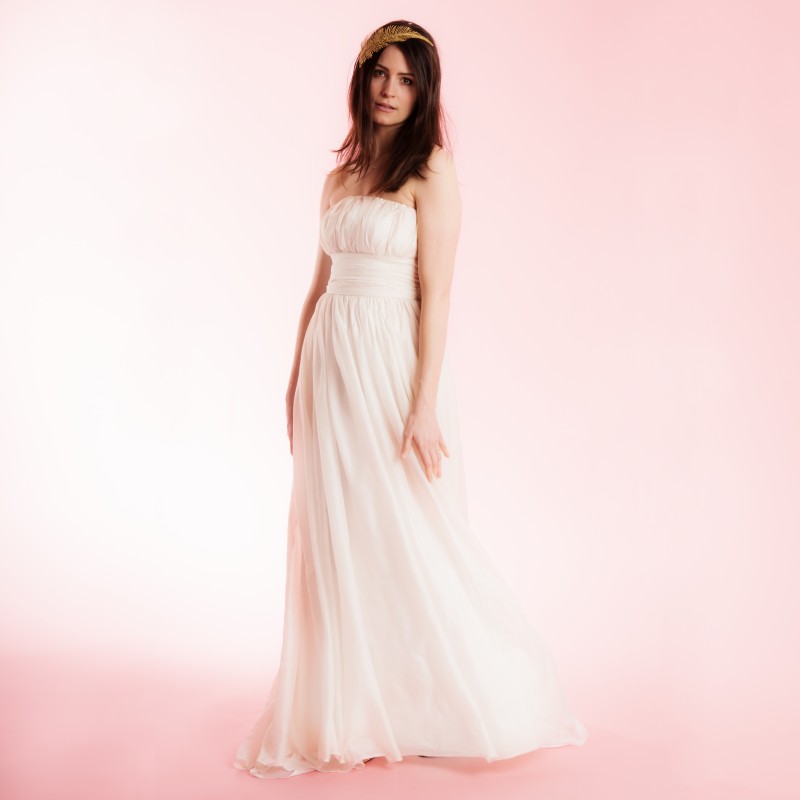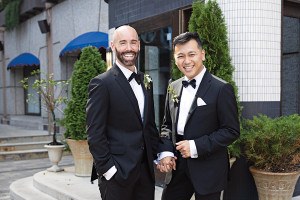Celia Grace: Bridal Gowns with Heart
 [“Amelia” silk gown / Chattman Photography]
[“Amelia” silk gown / Chattman Photography]
Celia Grace is a for-profit social enterprise founded by Groton native Marcelia “Marcie” Muehlke, whose mission is to create beautiful wedding gowns that also make a difference in the lives of women and the environment. The company is based in Amherst, while the FIT-trained head designer Alix Kivlin works in Brooklyn, New York. And, their production happens across the globe in Southeast Asia.
Muehlke chose Southeast Asia so that she could help the women living there earn money and gain confidence in a healthy, safe environment. She told us what Celia Grace is all about:
What made you want to start a bridal gown brand?
Marcie Muehlke: I came to this idea from my own experience as a bride. I got engaged in 2009 and my then boyfriend-now husband and I really wanted to have a wedding that reflected who we are as a couple. Environmental issues, human rights, and empowering women are all really important to us. And, since our wedding was going to be a huge investment of our time, money, and energy, we really wanted it to reflect the things we cared about.
We put a lot of effort into having a green wedding and we had the most amazing day we could possibly imagine. We went tubing down a river with our guests in Vermont and had a magical day. The only disappointment for me was the wedding gown because I wanted the perfect dress and I wanted it to be something I felt really good about. I wanted it to be something I knew was helping people . . . especially if I was going to wear it on this all-important day. I really wanted it to be improving the lives of everyone who touched it . . . but there was noting like that on the market.
What has been the most challenging part of starting this business?
MM: I started the business while I was a full-time graduate student. Needless to say, those are both full-time endeavors so it was pretty challenging. But, I went to Southeast Asia while I was finishing up my MBA and starting the business. I spent two weeks meeting with the silk weavers and the women who sewed the dresses. It was such an amazing experience, but also a pretty tough one . . . to travel halfway around the world and see some really tough things going on in these countries. But, it also added that much more meaning to what I was doing, seeing the downside to what was going on, but also the upside of what I was doing by starting Celia Grace.
What has been the most rewarding part?
MM: I love working with the women in Southeast Asia; these are smart, talented, professional women who speak several languages. They are coming out of really tough situations and they are incredibly talented seamstresses. I also love talking to brides who say to me, “this is just what I’ve been looking for!”
What makes Celia Grace gowns special?
MM: I think a lot about the supply and the back-end, but what we do with the supply chain is really reflected in the actual dresses themselves. If someone were to be flipping through dresses at a salon they would flip to ours without realizing that it was different . . . because they truly are classic, beautiful, white wedding gowns. But, the story behind it adds so much more. Each dress is handmade so when a bride places an order, that dress is made specifically for her. When you purchase the dress you’ll get a story card. You can see the faces of the women who actually made your dress and learn a little bit about them, and their lives, and feel that connection to these women.
We have production in Cambodia and Nepal and we’re trying to figure out a way to incorporate refugees who have escaped or moved to the United States and are rebuilding their lives here.
Your silk is woven without electricity. How does that work?
MM: The silk is hand woven on traditional wooden looms. This is a tradition that has been passed down through the families of these women for generations. No electricity is used, but they call them automatic looms because they are pulleyed from the shuttle back and forth. There’s a wet season and a dry season [in Southeast Asia]. In the wet season they collapse the looms and store them under their houses because their houses are on stilts. In the wet season everyone lives in the house and stays out of the mud and the flooding. Then, in the dry season, everyone lives underneath the houses because it’s cool and shady. People hang hammocks, swing their babies in the hammocks, weave silk, and call out to people passing by in the road. It’s a pretty amazing scene.
How do you communicate with the women producing the dresses?
MM: A lot of Skype phone calls. We talk with them via Skype, which is wonderful because we can show images and point to places on the dress. Alix went most recently around Thanksgiving and spent a week working with them hands-on.
Describe the dresses in your debut collection.
MM: Most of our styles are very clean, romantic, timeless, and understated. We want the beauty of the bride to shine through and for the dress to complement her. Our dresses are really determined by the fabrics we use. From the silk to the vintage-style lace made here in the USA, they are delicious, exquisite, lightweight dresses.
What advice do you have for brides searching for a wedding gown?
MM: Pick a dress that makes you feel beautiful. You have to look beautiful but also feel beautiful, and comfortable. Remember that it’s something you’re going to wear for a long period of time so make sure that it’s not too heavy, or uncomfortable, so you can enjoy the day and have fun.
See Celia Grace dresses up close and personal at a trunk show on April 25-27 at Flair Brides & Maids,140 Newbury St., Boston, 617-247-2828, flairbridesmaid.com.
Getting married? Start and end your wedding planning journey with Boston Weddings' guide to the best wedding vendors in the city.


